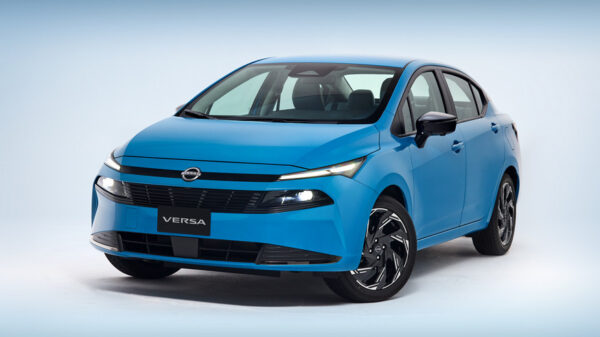 Grant Shapps is Secretary of State for Energy Security and Clean Zero Credit: Paul Grover
Grant Shapps is Secretary of State for Energy Security and Clean Zero Credit: Paul Grover
Grant Shapps has a -word distillation of the Labor leader's proposal Sir Keir Starmer to ban new oil and gas drilling licenses if he wins power next year: Madmen.
“I think their energy policy is actually a clear and present national security risk, just like that,” Shapps says. “I think the Labor Party has, in a sense, become the political wing of Just Stop Oil. They took the money from one of the same donors.»
Referring to Dale Vince, who founded the clean energy company Ecotricity, donated £1.5 million to Labor and joined the protests with the fight group with climate change Just. Stop oil.
Licensing policy, according to Shapps, «is one of those things where I'm sure it sounded like a really good idea in Islington, but basically it's crazy and dangerous.»
He adds: «It's crazy because we can't just stop using hydrocarbons, and even the Climate Change Committee says we'll still be using some of them in 2050. will bring them twice as much carbon, so it is completely doomed to failure.
“In the process, you will potentially destroy 140,000 jobs and hand over power to dictators like [Vladimir] Putin. So it really looks like a total surrender of our energy policy. This puts the country at risk in terms of security. This is naive. Even the trade unions call it naive.”
Labor's position is a little more subtle than simple distillation suggests. The key word is «new». Only new drilling licenses will be blocked by Sir Keir. Existing licenses will not be revoked, Labor has made it clear. So the wells already working in the North Sea will continue to work, which means that some of them will work for another two or three decades to come.
However, the difference in policy is real. Saying «more» to new drilling would be a big deal, drawing a line under the British oil and gas industry in the long run. This is a hotspot in the wider debate, which is playing out not only in the UK, but around the world, about how to stop and deal with potentially catastrophic global warming.
Grant Shapps quote
Both conservatives and Labor is publicly committed to the goal of making the UK 'net zero' carbon emitters by 2050, a goal that was enshrined in law under Theresa May. The differences are how far and how quickly to achieve this goal, as well as how much financial hardship should be passed on to households in the process.
Labor accuses the Tories of just paying lip service to the goal without making the politically difficult short-term decisions needed to achieve the goal by 2050. The Tories, in turn, accuse their rivals of putting the ideology of climate change ahead of the country's pressing economic needs, all too willing to risk jobs on the switch.
Isn't it true that after a century and a half of the industrial revolution and the turn to a carbon-free economy, British families will inevitably incur huge costs? «No no. No, I don't think that's right at all,» Shapps says, shrugging off the suggestion despite linking Labor's policy to the current inflation problem in the UK a few minutes earlier and arguing that in the future such approach may lead to higher prices by limiting supply. /p>
“The way I see my work is written here: energy security and net zero,” he adds, picking up an embossed and titled folder on the table. «Two sides of the same coin. If you ask me what I think about my first job, it's energy security, right? It ensures that the British have enough energy.
«Prices will now start to come down from next month «I want to see us with the cheapest electricity prices in Europe, one of the cheapest by the middle of the next decade. And I can only do that if I change how we generate energy intelligently.»
 Grant Shapps shrugged off the suggestion that British families would inevitably incur huge costs. Photo: Paul Grover
Grant Shapps shrugged off the suggestion that British families would inevitably incur huge costs. Photo: Paul Grover
Shapps is generally enthusiastic about his new role, which he took on in February, moving from business secretary to Rishi Sunak to head of the newly formed Energy Security Department and Net Zero. In fact, he is one of the prominent ministers left alive after the long Downing Street Conservative campaign that began in 2010 and spanned five different prime ministers.
He has been at the forefront since the first week of David Cameron's premiership as housing secretary, rising to the role of chairman of the Conservative Party, but then was expelled from the cabinet after winning the 2015 election. Under Theresa May, there was a time in the desert in the background when Shapps became one of the most famous Tory voices calling for her to leave, before the Cabinet returned under Boris Johnson with the role of transport secretary.
Another demotion came under Liz Truss before a shocking return when he spent six days as Home Secretary while Truss staggered and then fell, sliding from there into Sunak's office. cabinet and Sunak, his current political mentor.
The enmity between these two men is not a secret. The Johnsonites blame Sunak for bringing him down. Sunak stepped down as chancellor last July and other ministers rushed to the door, meaning Boris' time was up. So, if Johnson, no longer an MP, wants to be the Conservative candidate in his new seat next year, will Shapps support?
“Look, all these questions will be for the party,” he replies, apparently wary of talking about the return of the man who turned out to be a thorn in the side of the current Tory leader. «I don't think even Boris thinks he's going to run in the next election,» he adds, a conclusion that is in line with those around Johnson. Though others, including Truss, caution against excluding his return.
Shapps avoided another Boris uniform headache this week by discovering he was absent from a vote on the Privilege Committee's party gate report, which said Johnson had repeatedly and deliberately misled MPs about quarantine-violating parties, in No. 10. The House of Commons approved the report, i.e. Johnson. was stripped of his parliamentary ticket — something never done before to a former prime minister — but dozens of Tories did not vote, including Shapps.
The feud between Rishi Sunak and Boris Johnson is 'not a secret' Credit: NurPhoto via Getty Images
So, Shapps agrees with the report? His response is a tightrope: “We have set these things up. We may not like what they say. And by the way, I think it's absolutely right that people are allowed to criticize what the report says. That in itself is democracy.
“But in the end, the process starts. Too many columns have been wasted going around in circles, and so I don't think I can add anything of value to this.»
Shapps has developed a reputation as an effective media communicator. His videos from when he was secretary of transport, one of which featured a cameo by Michael Portillo, the great conservative-turned-television presenter, at a train station, are now being copied by other cabinet ministers.
He is also known for his number manipulation. Since the Theresa May uprising, Shapps has maintained a spreadsheet detailing each Conservative MP's past votes and positions, trying to accurately predict how key votes will play out. It was used to promote Johnson to the premiership in 2019 and keep him there as peers began to apply. Shapps predicted the result of last June's vote of no confidence among Conservative MPs against Johnson to within one vote using the system. average opinion poll data, how is the mood among Conservative deputies now?
“Listen, as is often the case in the middle of parliament, you can have very difficult times,” Shapps says. «We've had it with Covid, with the war in Ukraine, and with some issues that, frankly, have brought on some incredibly difficult times.
«On the other hand, we now have leadership with Rishi which is solid and healthy. [His] five priorities are, I think, really aligned with your readers' priorities. Stopping small boats, developing the economy are missions of fundamental importance. And I think most people actually also understand that what Rishi offers is the ability to solve problems.”
He refers to the post-Brexit trade facilitation deal between Northern Ireland and the rest of the UK – the Windsor Framework – that was agreed in February. «A lot of people, a lot of commentators have told us that it's impossible to solve, and [Sunak] is paying enough attention to it,» he says.
Grant Shapps pulls quote 2
The prime minister will need every ounce of his problem-solving skills to accomplish one of the government's most ambitious goals: phasing out all petrol, diesel cars and vans in favor of electric vehicles. Shapps was revealed to be an EV evangelist. “They are impressive,” he says. “When you change gear, you have the same amount of effort everywhere.
“They are fantastic. I want to make [transition to electricity] comfortable. I don't believe in doing it in a way that would destroy our energy security, or doing it in a way that would cost British families money. I want to focus on the safety side.» Praise for electric vehicles comes from personal experience. Shapps is already on his second Tesla.
What about the high prices of electric cars and the current concerns about public charging infrastructure in the UK? He says he is confident prices will come down. “Ultimately they have to get cheaper because a combustion engine car has 20,000 moving parts and an electric car has about 200. So in many ways they are much simpler.”
Shapps adds that around 70% of Britons have driveways or off-street parking spaces, so if the government can actually put in place the charging infrastructure – a big if – then there is room for a wider pickup.
An encouraging sign that the government is able to put its money into action when it comes to protecting households from net zero financial costs is the way it has approached the hydrogen issue. As a carbon- and methane-free gas, hydrogen is seen as critical as Britain moves away from more polluting energy sources. Like many newer, cleaner forms of energy, the government is seeking to help the industry grow by providing financial support.
 Both conservatives and Labor is publicly committed to having the UK a 'net zero' carbon emitter by 2050. Photo: Tom Leese/Pennsylvania
Both conservatives and Labor is publicly committed to having the UK a 'net zero' carbon emitter by 2050. Photo: Tom Leese/Pennsylvania
The question, as always, is where the money comes from. The ministers proposed a «hydrogen tax», the idea of which was to add a small extra amount to electricity bills — as has been done for years for other forms of «green» energy. But in recent weeks, conservatives have risen in revolt against this proposal, which is included in the energy bill that is going through parliament.
Shapps has previously indicated his nervousness about the move, but is now ready to be frank: he does not want the fee to be included directly in household bills. He says, “What we need to do is make sure, A, that we can get our hydrogen industry going. Very, very important, great export opportunities, great way to store energy, great way to power heavy industry and all that. And, B., I don't want this to unnecessarily cut people's household bills.»
Pushed for clarification, Shapps hardens the line: «We know we need to fund this transition, but we don't.» I don't want to do it at the expense of household taxes.» He also talks about how nuclear power could make the UK's future cleaner and greener. Shapps recently visited Hinkley Point C, the next major nuclear power plant to come online.
He says: “The Hinckley Point reactor itself will be the most powerful nuclear reactor in the world in terms of energy produced. Thus, this country, which built Calder Hall in Cumbria in 1953 and became the first country in the world to have civilian nuclear power, is about to have the world's most powerful nuclear reactor in terms of electricity production.»
< p>Sizewell C will follow Hinckley. Small nuclear reactors will also be part of the mix, Shapps says. “We have a lot of great small modular nuclear reactor companies in this country that are doing a lot of really cool stuff. Overall, Rolls Royce, which has been successfully operating small modular reactors on nuclear submarines underwater for decades, is a world leader. And we have many other smaller firms. So I think there is a huge opportunity for this country to take the lead, and every country wants that.”
Energy policy is set to become one of the main dividing lines between Labor and the Conservatives in the next election. And it's no surprise that Shapps, the great Tory cheerleader, is generally optimistic about his party's chances. Downing Street says it is convinced that the polls closed after Sunak replaced Trass will be even tougher in the next election due sometime in 2024, most likely in the fall.
Some Conservative MPs privately fear that 1997-style destruction could happen, but Schapps disagrees.
I'm really looking forward to it being a 1992 or 2015 moment, in fact, if we're going to back to history,” he replies. The first was when Neil Kinnock «We're Fine!» A statement at a rally shortly before the election turned out to be illusory: John Major's Tories defeated Labor again, while the latter saw David Cameron break out of the Coalition's chains with a new Tory majority.
“Of course, no one. can accurately predict what will happen. I'm not saying that we will win, I'm saying that we can win,” says Shapps.
Time is running out to turn the possible into the probable.


























































Свежие комментарии